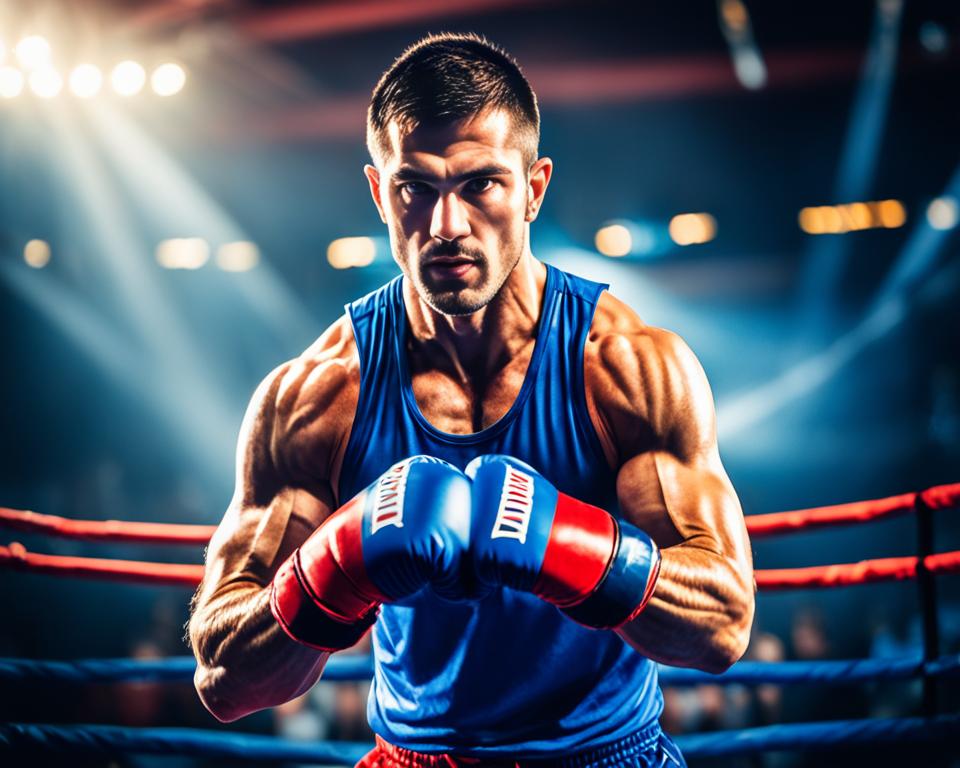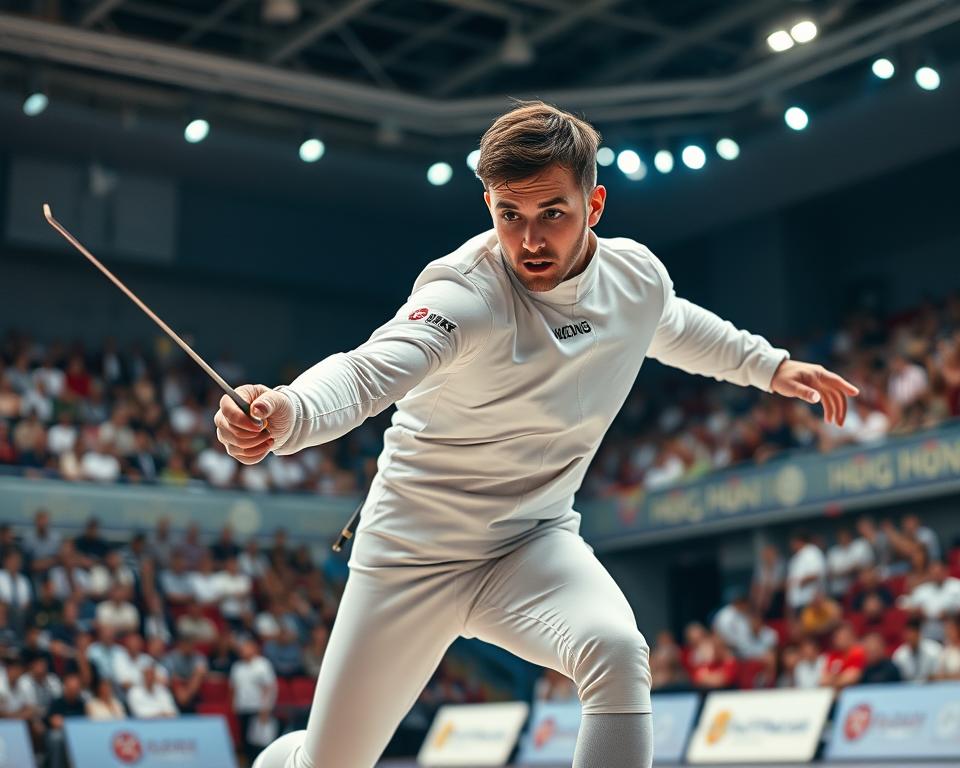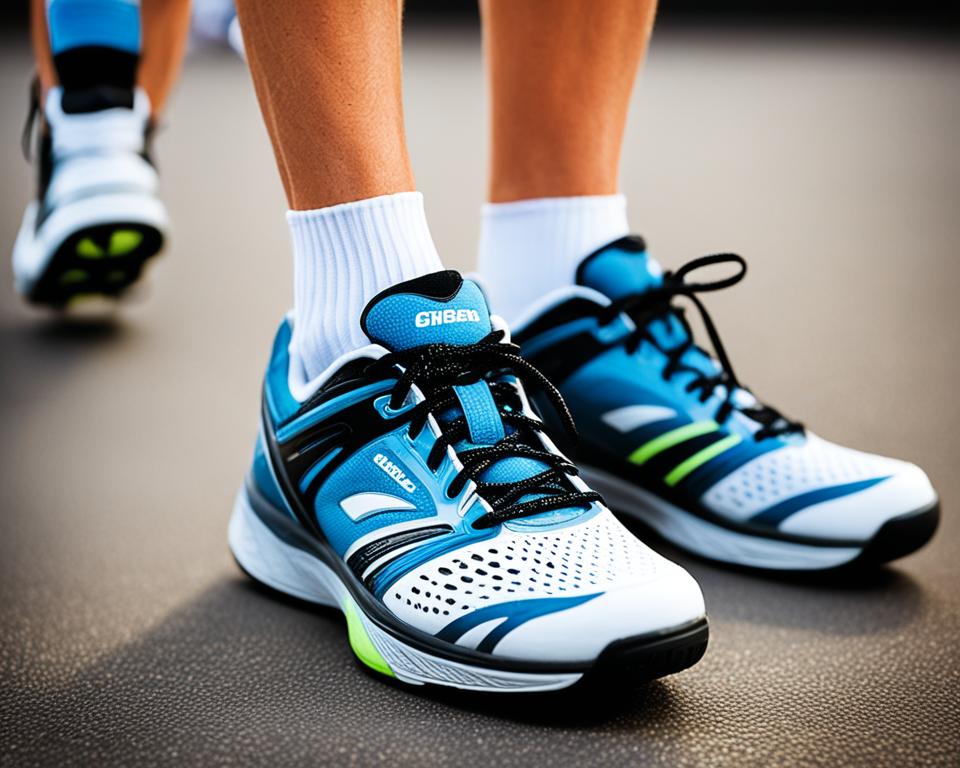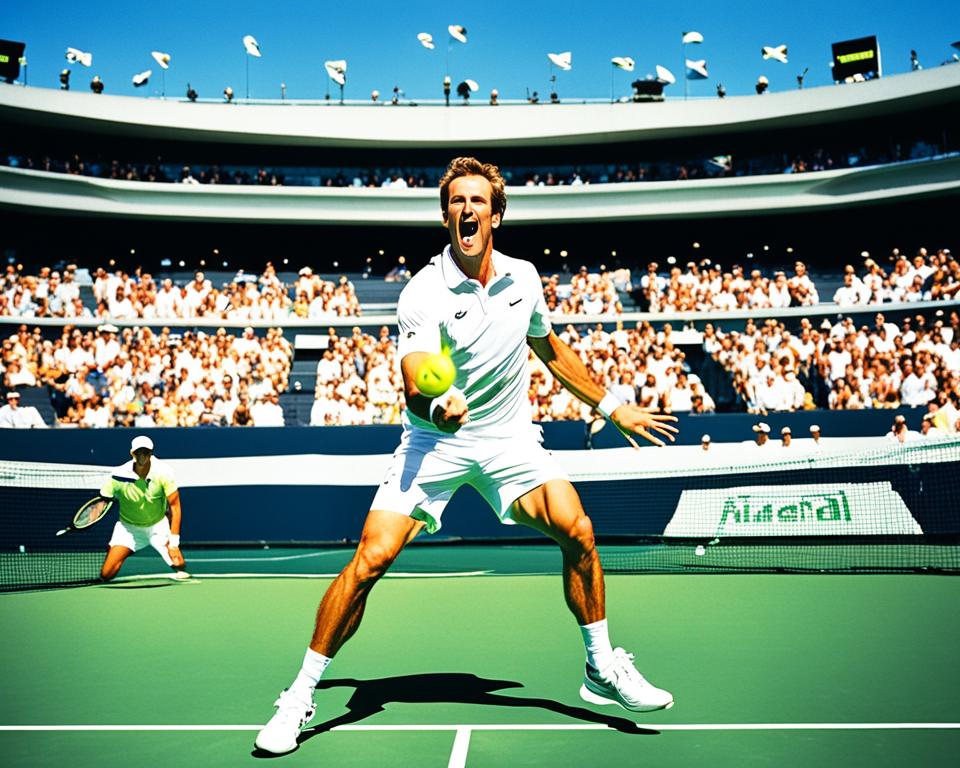The Olympic Games are coming, and people are wondering: will Muay Thai, Thailand’s famous martial art, join the Olympics? This ancient fighting style, known as the “Art of Eight Limbs,” has won fans worldwide with its power and cultural depth. Getting into the Olympics has been tough, with many challenges and debates.
Muay Thai has a long history, starting as a combat technique and now loved by fans everywhere. It’s become popular worldwide, with gyms and events in many places. Now, the big question is: will it be part of the Olympic Games?
Getting into the Olympics means meeting strict rules and keeping Muay Thai true to its roots. Groups and fans are working hard to make this happen. Everyone is excited about the chance of Muay Thai being in the Olympics.
Read more interesting information at ::lansdowne-moody
The Ancient Roots of Muay Thai
Muay Thai, Thailand’s national sport, has a long history that goes back centuries. It shows the deep cultural importance and its role in shaping Thai identity.
Tracing the Origins of Thailand’s National Sport
Muay Thai started in the 16th century as a self-defense skill for Thai soldiers. It was called “Muay Boran,” meaning “ancient boxing.” This sport showed the Thai people’s strength, courage, and spirit against hard times.
Historical Significance and Cultural Importance
- Muay Thai was key in Thai military training, improving soldiers’ fighting skills.
- It became popular beyond the battlefield, being part of Thai celebrations and festivals.
- As a traditional sport, Muay Thai is a symbol of national pride, showing Thai history and resilience.
Today, Muay Thai still fascinates people all over the world. Its ancient traditions and cultural importance keep it popular. From its start as a self-defense tool to now being a respected martial art and national sport, Muay Thai shows the Thai people’s strong spirit.
Muay Thai: The Art of Eight Limbs
Muay Thai is a famous martial art from Thailand, known as the “art of eight limbs.” It’s different from other combat sports because it uses the whole body as a weapon. Fighters use their fists, elbows, knees, and shins to hit their opponents. This makes Muay Thai exciting and powerful.
Muay Thai focuses on using all eight limbs effectively. Fighters learn special techniques and timing to hit from any angle. This makes them strong opponents in the ring. It’s different from martial arts that focus on just a few moves.
- Fists: Muay Thai fighters are known for their powerful punches, using their fists to deliver rapid-fire combinations and devastating blows.
- Elbows: The use of elbows in Muay Thai adds a ruthless element to the art, allowing fighters to unleash sharp, close-range strikes.
- Knees: Powerful knee strikes are a hallmark of Muay Thai, enabling fighters to generate immense force and impact from a relatively short distance.
- Shins: Muay Thai practitioners hone the strength and durability of their shins, using them to deliver bone-crushing kicks and blocks.
Mastering these eight limbs takes a lot of training and getting in shape. Muay Thai fighters need quick reflexes, strong power, and lots of stamina for long fights. This makes Muay Thai a unique and exciting martial art for both fighters and fans.
“In Muay Thai, your entire body becomes a weapon. You must learn to wield each limb with precision and power to emerge victorious.”
Muay Thai shows the deep history and cultural importance of this martial art. It has grown over centuries and is now a source of pride for the Thai people. Its mix of tradition and modern competition has made it popular worldwide.
The Global Popularity of Muay Thai
Once limited to Thailand, Muay Thai has become a worldwide hit. It has won over fans all over the globe. This ancient martial art has moved beyond its roots, becoming a well-known and exciting combat sport.
Expansion Beyond Thailand’s Borders
Muay Thai’s popularity around the world is thanks to its dynamic and eye-catching nature. It has made its way onto international stages, drawing in more and more people. Now, it’s loved in places like Europe, North America, Asia, and Africa.
It has found a special place by mixing tradition with modern athleticism. This has made it a favorite among many.
Acceptance as a Combat Sport
What was once a little-known discipline is now a respected combat sport. Its unique moves, like using fists, elbows, knees, and shins, have won over fans everywhere. Muay Thai events and competitions are now big deals, thanks to major martial arts groups and events.
The sport’s global reach has grown thanks to more people looking for new combat sports. Training spots are easy to find, and the mix of old and new in Muay Thai appeals to many. As it keeps drawing in new fans and fighters, Muay Thai’s global fame is set to keep growing.
“Muay Thai has become a global phenomenon, showcasing the power and grace of this ancient martial art to audiences worldwide.”
Olympic Recognition: A Challenging Quest
The quest for olympic recognition of Muay Thai has been ongoing. This sport from Thailand has gained fans worldwide. Now, it aims to join the international olympic committee. This goal is both exciting and complex.
The International Olympic Committee’s Criteria
The International Olympic Committee (IOC) sets tough rules for sports to join the Olympics. These rules cover global reach, how many people play, and the sport’s leadership. They also look at how well it fits the Olympic values.
- Global Popularity: The IOC wants sports that are loved and played on many continents.
- Governance and Administration: Strong leadership, clear rules, and good anti-doping policies are key.
- Alignment with Olympic Values: Sports must stand for fair play, sportsmanship, and striving for the best.
Muay Thai faces big hurdles to get olympic recognition. Meeting the IOC’s strict rules is a big challenge.
Everyone is watching if Muay Thai will make it to the Olympics. The sport’s leaders are hard at work. They aim to meet the IOC’s criteria and achieve this big goal.
Muay Thai’s Potential Olympic Debut
The idea of Muay Thai, Thailand’s national martial art, joining the Olympic Games has sparked a lot of talk. This unique and exciting martial art is gaining fans worldwide. This has led to calls for it to be part of the Olympics.
Muay Thai’s path to the Olympic Games has been long and complex. The International Federation of Muaythai Associations (IFMA) is pushing for its inclusion. They’re showing the IOC how popular and rich in history Muay Thai is.
Whether Muay Thai makes it to the Olympics depends on many factors. The IOC looks for sports that match their values and criteria. Muay Thai fits well with the Olympic values of discipline and sportsmanship. Its global popularity also makes it stand out.
| Criteria | Muay Thai’s Alignment |
|---|---|
| Popularity and Global Reach | Muay Thai is big in Thailand and getting bigger worldwide. It’s practiced and competed in many countries. |
| Alignment with Olympic Values | Muay Thai teaches discipline, respect, and sportsmanship. These are key Olympic values. |
| Technical Complexity and Skill | Muay Thai is a tough martial art that needs years of practice. It requires mastering many techniques. |
The Olympic Games are always changing, and so is the talk about Muay Thai joining them. Supporters believe that with hard work, Muay Thai could become part of the Olympics. It would show the world its tradition, athleticism, and global appeal.
“Muay Thai is not just a sport, it’s a way of life. Its inclusion in the Olympic Games would be a testament to the sport’s global reach and its ability to captivate audiences worldwide.”
Adapting Muay Thai Rules for the Olympics
Muay Thai is getting more popular worldwide, making its Olympic debut a hot topic. But, making Muay Thai fit the Olympic rules is tricky. It’s all about keeping the sport’s true spirit while following Olympic rules.
Striking a Balance Between Tradition and Regulations
Muay Thai, also known as the “Art of Eight Limbs,” has a long history and its own set of rules. Adding these rules to the Olympics is a big challenge. It needs careful thought from governing bodies and fans of Muay Thai.
One big thing to think about is how to use the eight limbs (fists, elbows, knees, and shins) safely in fights. The Olympics might need changes to keep athletes safe and follow the International Olympic Committee’s rules.
- Exploring ways to keep Muay Thai’s dynamic and aggressive style while being safe
- Changing scoring systems to value Muay Thai’s unique moves and tactics
- Keeping Muay Thai’s culture and traditions in the Olympic games
Getting Muay Thai into the Olympics needs a lot of thought and teamwork. It’s about finding a middle ground between tradition and rules. This way, Muay Thai can show off on the world stage and still respect its heritage.
“The true essence of Muay Thai lies in its unwavering respect for tradition and the seamless integration of its unique techniques. As we explore the path to the Olympics, we must ensure that this essence remains intact.”
Will Muay Thai Be in the Olympics?
Many people are talking about whether Muay Thai will be in the Olympics. This martial art from Thailand has been around for centuries. It has a rich culture tied to it. The idea of Muay Thai joining the Olympics is both exciting and challenging.
The International Olympic Committee (IOC) has strict rules for sports to be recognized. They look at how popular a sport is, its organization, and if it fits the Olympic values. Muay Thai is getting better in these areas, but it’s a tough road ahead.
- Widespread global appeal: Muay Thai is becoming more popular around the world. More people are taking part and watching it on different continents.
- Strengthening governance: Groups like the World Muay Thai Organization are making rules and structures clearer. This helps meet the IOC’s standards.
- Alignment with Olympic values: Supporters say Muay Thai’s focus on discipline, respect, and personal growth matches the Olympic spirit.
But, Muay Thai still has hurdles to overcome. The sport is very physical and can be dangerous. This worries the IOC about athlete safety and injuries. Also, Muay Thai’s traditional rules might need to change for the Olympics, which is a tricky situation.
The chance of Muay Thai being in the Olympics keeps people talking. The road ahead will have ups and downs. Yet, the passion of Muay Thai fans worldwide could push it onto the Olympic stage.
Challenges and Controversies
The debate over olympic inclusion of Muay Thai is ongoing. It faces many challenges and controversies. Advocates must balance the sport’s tradition with the changing Olympic standards.
Debates Surrounding Muay Thai’s Olympic Inclusion
The main debate is about Muay Thai’s safety and if it fits the IOC’s rules. Supporters say the sport can be made safe for the Olympics with the right training. Critics worry about the risks of injury and other controversies.
| Arguments for Olympic Inclusion | Arguments Against Olympic Inclusion |
|---|---|
|
|
These debates show the tough challenges Muay Thai faces in becoming part of the Olympics.
“The decision to include Muay Thai in the Olympics will have far-reaching implications for the sport and its global recognition.”
As talks go on, it’s key for Muay Thai leaders to work with the IOC. They need to address the sport’s controversies. This way, they can keep Muay Thai’s true spirit while meeting the IOC’s safety and rules.
The Impact of Olympic Recognition
Adding Muay Thai to the Olympic Games could change the sport and its athletes’ lives. Being part of the Olympics would make Muay Thai more popular worldwide. It would also bring many benefits to the sport and its fighters.
Benefits for Athletes and the Sport
One big plus of olympic recognition for Muay Thai is more people would see it. This could make more people want to try it, join, and support it. This would help the athletes who work hard at their sport.
- Enhanced Opportunities: Olympic recognition would bring more chances for Muay Thai athletes. They could get more scholarships, sponsorships, and places to compete.
- Improved Training and Development: With more attention and resources, Muay Thai training centers could get better. They could hire top coaches and invest in sports science. This would make training and developing athletes better.
- Increased Prestige and Legitimacy: Being in the Olympics would make Muay Thai more respected worldwide. It would prove it’s a top combat sport.
The benefits of olympic recognition for Muay Thai aren’t just for the athletes. They also help the sport grow and improve overall.
| Potential Benefits | Description |
|---|---|
| Grassroots Expansion | More people learning about Muay Thai could lead to more training centers. It would help find new talent. |
| Improved Regulations and Safety | Being part of the Olympics would mean safer rules and better safety measures. This would protect Muay Thai fighters. |
| Cultural Preservation | Being in the Olympics could keep Muay Thai’s culture alive. It would make sure its traditions are shared with future generations. |
The benefits of olympic recognition for Muay Thai are big. They promise a bright future for the sport and its athletes. As they work towards this goal, Muay Thai fans around the world look forward to seeing their sport in the Olympics.
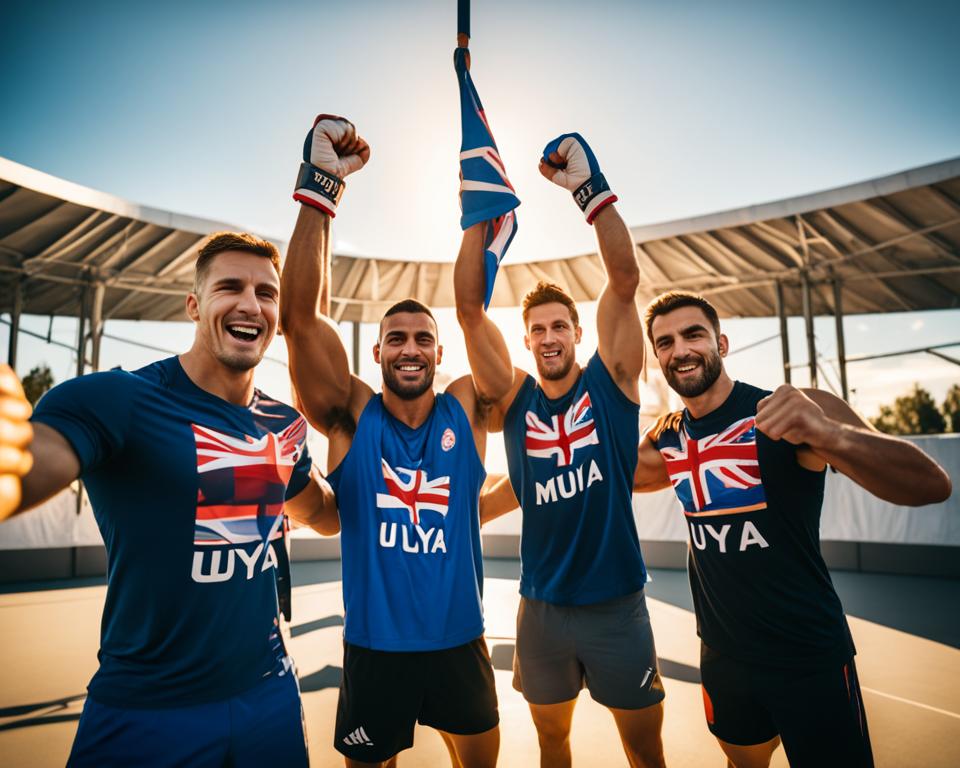
Muay Thai’s Pathway to Olympic Glory
As the quest for olympic inclusion grows, Muay Thai fans are excited about the sport’s possible Olympic debut. The journey to this big moment is filled with hurdles and chances.
The first step is the work of groups like the International Federation of Muaythai Associations (IFMA). They aim to make Muay Thai fit the International Olympic Committee’s (IOC) rules. This means making safety measures better, setting up fair judging, and ensuring competitions are fair.
- Expanding Muay Thai’s global footprint: The IOC is taking notice of the sport’s growing popularity. But, it’s important to get more people involved and recognized in different parts of the world.
- Showcasing Muay Thai’s unique identity: It’s important to keep the art’s cultural roots while following Olympic rules. Groups are working hard to find this balance.
- Securing financial and logistical support: Getting the money and setup needed for Olympic Muay Thai events is a big task. It requires working together between national and international groups.
As the pathway to olympic inclusion moves forward, Muay Thai fans are hopeful. The sport’s exciting moves and cultural background make it a strong contender for the Olympics.
| Key Milestones | Progress Toward Olympic Inclusion |
|---|---|
| Alignment with IOC Criteria | Ongoing efforts by governing bodies to refine rules and regulations |
| Expanding Global Reach | Increasing Muay Thai’s popularity and participation worldwide |
| Preserving Cultural Identity | Balancing tradition with Olympic regulations |
| Securing Necessary Resources | Collaboration between national and international governing bodies |
The pathway to olympic inclusion is still unfolding. The future of Muay Thai on the world stage is exciting and changing.
“The road to the Olympics is paved with dedication, innovation, and a unwavering commitment to the sport’s core values. Muay Thai is poised to embark on this remarkable journey.”
The Role of International Federations
International federations and governing bodies are key in getting Muay Thai into the Olympics. They lead the charge to make the sport known and meet the IOC’s tough rules.
Governing Bodies and Their Efforts
The World Muay Thai Organization (WMO) and the International Federation of Muaythai Associations (IFMA) are leading the way. They work hard to make Muay Thai fit the IOC’s rules. This includes things like global participation, anti-doping, and looking after athletes.
These groups have started many projects to make Muay Thai more popular worldwide. They’ve set up international tournaments, helped athletes from different cultures meet, and pushed the sport into new areas. Their goal is to show Muay Thai is ready for the Olympics.
| International Federation | Key Efforts |
|---|---|
| World Muay Thai Organization (WMO) |
|
| International Federation of Muaythai Associations (IFMA) |
|
The hard work of these federations and governing bodies has really helped Muay Thai. They’ve made the sport more known and ready for the Olympics.
National Pride and Representation
Muay Thai is more than just a martial art in Thailand. It’s a symbol of national pride, showing the strength and fighting spirit of the Thai people. The idea of Muay Thai being in the Olympics has brought excitement and hope to the country.
Having Muay Thai in the Olympics would be a big deal for Thailand. It would highlight the sport’s skill and history. It would also show off Thailand’s culture and athletic abilities to the world.
For the Thai people, seeing Muay Thai in the Olympics would be a huge honor. It would bring people together, encouraging athletes to aim high and the nation to support them. Watching their favorite sport compete with the best would fill everyone with pride and joy.
| Factors Enhancing Muay Thai’s Representation | Potential Impact of Olympic Recognition |
|---|---|
|
|
Adding Muay Thai to the Olympics would boost its global image and be a symbol of Thailand’s pride. As people wait for this big event, excitement is building. It shows how important Muay Thai is to the Thai people.
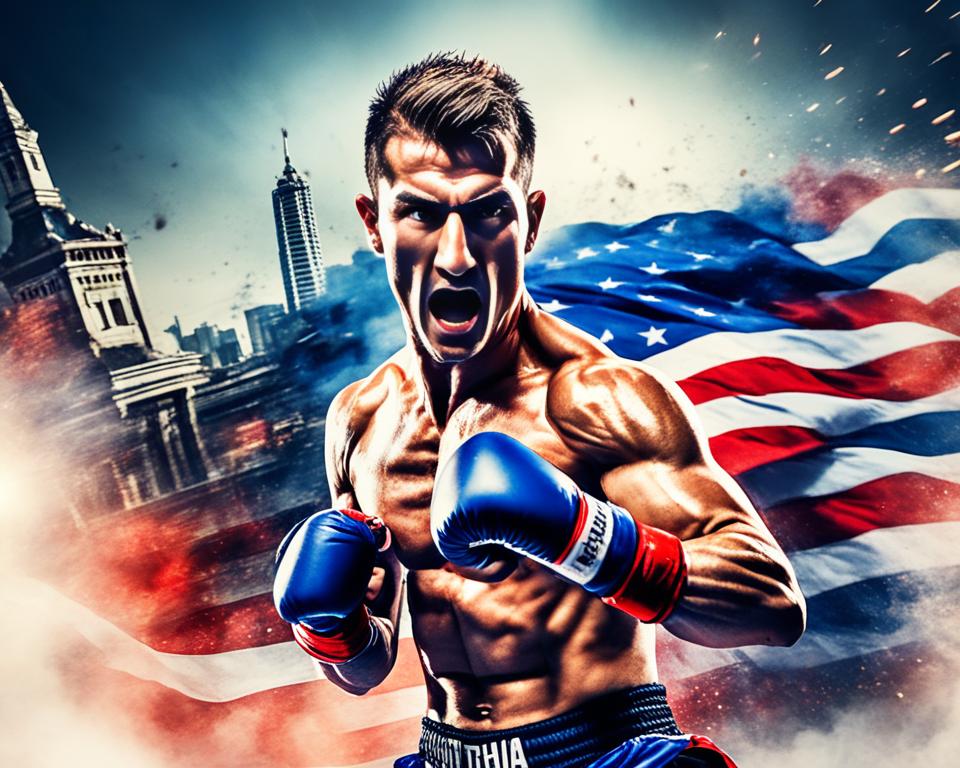
“Muay Thai is not just a sport; it is a way of life, a reflection of our national identity. Its inclusion in the Olympics would be a triumph for Thailand, a source of immense pride and unity for our people.”
Alternative Avenues for Muay Thai
Muay Thai’s journey to become part of the Olympics is ongoing. Yet, there are other ways for the sport to shine on a global level. These options let Muay Thai show off its beauty and skill worldwide, even if it’s not in the Olympics.
Exploring Other International Platforms
The World Games is one such platform. It’s a big event that brings together many sports, including combat ones. Muay Thai could be there as a demo sport or a full competitor, getting international recognition far from Thailand.
Another chance is the Asian Games, held every four years. It’s run by the Olympic Council of Asia and has had martial arts before. Muay Thai could join this big event, boosting its alternative platforms for growth and visibility.
| Event | Potential for Muay Thai |
|---|---|
| World Games | Opportunity for Muay Thai to be included as a demonstration or competitive sport |
| Asian Games | Possibility of Muay Thai being added to the roster of martial arts disciplines |
By looking into these alternative platforms, Muay Thai can keep getting international recognition. It can share its culture and athletic skills with the world, even if it’s not in the Olympics.
The Future of Muay Thai on the Global Stage
Muay Thai is winning hearts all over the world, and its future looks bright. It has a deep history, is getting more popular, and can adapt to new situations. This makes it set for success, even if it doesn’t make it to the Olympics.
Its strength as a combat sport has helped it spread globally. People love how it changes yet keeps its traditions. This ability to evolve will help Muay Thai face future challenges and opportunities, making it a respected sport worldwide.
As Muay Thai moves forward, we’ll see more teamwork between national groups, international leaders, and event planners. This teamwork will make rules clearer, help athletes grow, and make the sport more visible globally. With the support of fans and the hard work of its followers, Muay Thai is set to reach more people and inspire new martial artists.
